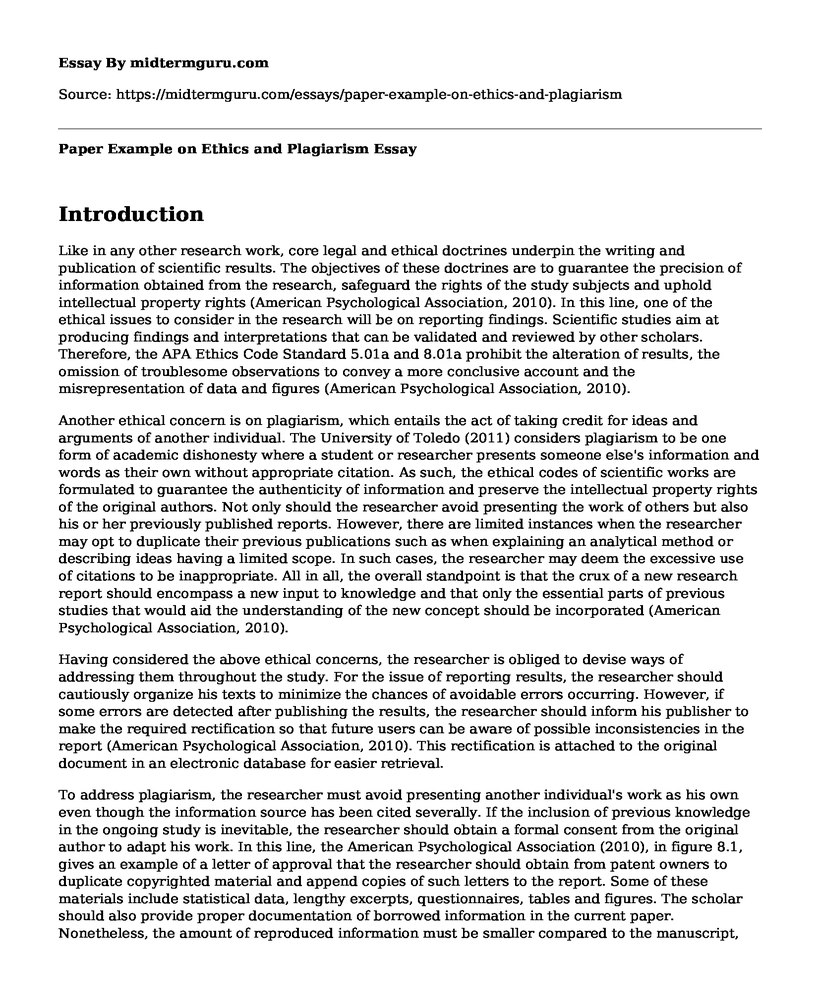Introduction
Like in any other research work, core legal and ethical doctrines underpin the writing and publication of scientific results. The objectives of these doctrines are to guarantee the precision of information obtained from the research, safeguard the rights of the study subjects and uphold intellectual property rights (American Psychological Association, 2010). In this line, one of the ethical issues to consider in the research will be on reporting findings. Scientific studies aim at producing findings and interpretations that can be validated and reviewed by other scholars. Therefore, the APA Ethics Code Standard 5.01a and 8.01a prohibit the alteration of results, the omission of troublesome observations to convey a more conclusive account and the misrepresentation of data and figures (American Psychological Association, 2010).
Another ethical concern is on plagiarism, which entails the act of taking credit for ideas and arguments of another individual. The University of Toledo (2011) considers plagiarism to be one form of academic dishonesty where a student or researcher presents someone else's information and words as their own without appropriate citation. As such, the ethical codes of scientific works are formulated to guarantee the authenticity of information and preserve the intellectual property rights of the original authors. Not only should the researcher avoid presenting the work of others but also his or her previously published reports. However, there are limited instances when the researcher may opt to duplicate their previous publications such as when explaining an analytical method or describing ideas having a limited scope. In such cases, the researcher may deem the excessive use of citations to be inappropriate. All in all, the overall standpoint is that the crux of a new research report should encompass a new input to knowledge and that only the essential parts of previous studies that would aid the understanding of the new concept should be incorporated (American Psychological Association, 2010).
Having considered the above ethical concerns, the researcher is obliged to devise ways of addressing them throughout the study. For the issue of reporting results, the researcher should cautiously organize his texts to minimize the chances of avoidable errors occurring. However, if some errors are detected after publishing the results, the researcher should inform his publisher to make the required rectification so that future users can be aware of possible inconsistencies in the report (American Psychological Association, 2010). This rectification is attached to the original document in an electronic database for easier retrieval.
To address plagiarism, the researcher must avoid presenting another individual's work as his own even though the information source has been cited severally. If the inclusion of previous knowledge in the ongoing study is inevitable, the researcher should obtain a formal consent from the original author to adapt his work. In this line, the American Psychological Association (2010), in figure 8.1, gives an example of a letter of approval that the researcher should obtain from patent owners to duplicate copyrighted material and append copies of such letters to the report. Some of these materials include statistical data, lengthy excerpts, questionnaires, tables and figures. The scholar should also provide proper documentation of borrowed information in the current paper. Nonetheless, the amount of reproduced information must be smaller compared to the manuscript, the text must openly recognize the relevant sections where the material was initially documented and the researcher must clearly cite the original words both in-text and in the reference list. Moreover, the researcher should also give publication credit to the main authors of the material which he adapted to echo their specific contributions to his work. If needed, the American Psychological Association (2010) acknowledges the researcher may be required to show proof of compliance with the above ethical standards, which may take the form of the certification shown in figure 8.2.
References
American Psychological Association. (2010). Publication manual of the American Psychological Association (6th ed.). Washington, DC: Author
University of Toledo. (2011). Policy Statement on Academic Dishonesty. Retrieved from http://www.utoledo.edu/policies/academic/undergraduate/pdfs/3364-71-04%20%20Academic%20dishonesty.pdf
Cite this page
Paper Example on Ethics and Plagiarism. (2022, Sep 20). Retrieved from https://midtermguru.com/essays/paper-example-on-ethics-and-plagiarism
If you are the original author of this essay and no longer wish to have it published on the midtermguru.com website, please click below to request its removal:
- Rhetorical Analysis on the Banking Concept of Education
- Use of English and Communication Factors in Hospitality in Kazakhstan
- Exams as a Measure of Students Abilities - Education Essay Example
- Depression in College Students: Annotated Bibliography
- Single-Parenting: A Growing Phenomenon - Research Paper
- E-Learning Classes Impeded by Strict Copyright Law in US - Essay Sample
- Creating a Safe & Supportive Environment for Children's Growth & Development - Essay Sample







